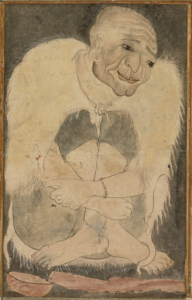Of Mice and Chimps (and Finches too)
Human Sciences, Iran, No. 55: 71-78 Perhaps the most challenging as well as the most interesting question raised in linguistic studies is the Innateness Hypothesis of Human Language. There have been various types of evidence proposed to corroborate such a hypothesis. One type is based on different linguistic disorders resulting from brain damages. In the […]
By Juan Uriagereka
January 1, 2008
Así Habló (o tal vez no) el Neanderthal
Teorema, XXVIII, pp. 73-83 Two Neanderthals from El Sidrón (Asturias, Spain) have been recently analyzed for possible mutations in FOXP2, a gene involved in the faculty of language. Although this gene was believed to be specific to modern humans, the analysis in question revealed otherwise. The present article reflects on the meaning of this finding, […]
By Antonio Benítez-Burraco, Victor Longa, Guillermo Lorenzo, Juan Uriagereka
January 1, 2008
Desperately Evolving Syntax
The Chomsky Hierarchy (CH) gives a first approximation as to where human syntax lies in an abstract logical space: the generating device accepting appropriate languages should be slightly more powerful than a standard Push-Down Automaton (a PDA+), although for familiar reasons not much more so. An evolutionary study of syntax ought to give us some […]
By Juan Uriagereka
January 1, 2008
A Critique of Phase Extension, With a Comparison to Phase Sliding
Theoretical Linguistics, 33, 65-74 1. Introduction Den Dikken’s paper (henceforth DD) explores an interesting alternative to Chomsky’s conception of Phase Theory to account for different phenomena involving Predicate Inversion (PI). In particular, DD concentrates on cases of so-called copular, locative, and dative inversion (the respective instances in (1)): a. The #1 best-seller in the country is this […]
By Ángel J. Gallego, Juan Uriagereka
August 27, 2007
Clarifying the Notion “Parameter”
Biolinguistic Investigations and the Formal Language Hierarchy This chapter reflects on parameters or, more generally, linguistic variation, which seems hardly a unified phenomenon. It suggests that there are three progressively deeper forms of variation to configure an I-language. The chapter argues that there are three sorts of systemic variations and also that Sub-case parameters must […]
By Juan Uriagereka
January 1, 2007
On the Metaphysics of Linguistics
Prospects for Dualism, W. Hinzen (ed.), special issue of Erkenntnis Mind–body dualism has rarely been an issue in the generative study of mind; Chomsky himself has long claimed it to be incoherent and unformulable. We first present and defend this negative argument but then suggest that the generative enterprise may license a rather novel and […]
By Wolfram Hinzen, Juan Uriagereka
October 20, 2006
The Dynamics of Islands: Speculations on the Locality of Movement
The paper is divided as follows. In section 2 we pose various questions that arise when attempting to rationalize islands. We begin to address some of these questions in section 3, where the basic LCA line is presented. In sections 4 and 5 we explore a variety of consequences that this approach has for conditions […]
By Norbert Hornstein, Howard Lasnik, Juan Uriagereka
September 29, 2006
Complete and partial Infl
This paper argues that ‘null’ Case appears in person-less elements, including (some) clauses in addition to PRO, while ‘full’ Case shows up in regular nominals. Several data are adduced in this regard, the pertinent distribution being decided when constructing cyclic lexical arrays through an economy metric: Full Case/person features are required only on elements that […]
By Cedric Boeckx, Juan Uriagereka
July 26, 2006
Towards a syntax of Proto-Basque
In this note, I reflect on a reconstructive path for the syntax of Proto-Basque, building on the results of Gomez and Sainz (1995), working on a tradition started already by Astarloa two centuries ago, and of which Trask (1977) is an excellent example. The matter is interesting not just in itself, but also in that […]
By Juan Uriagereka
April 11, 2006








